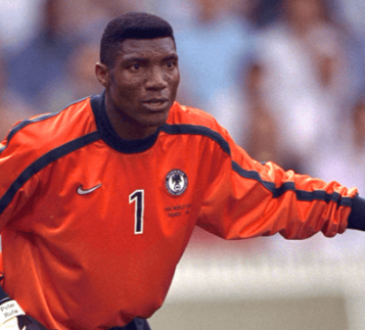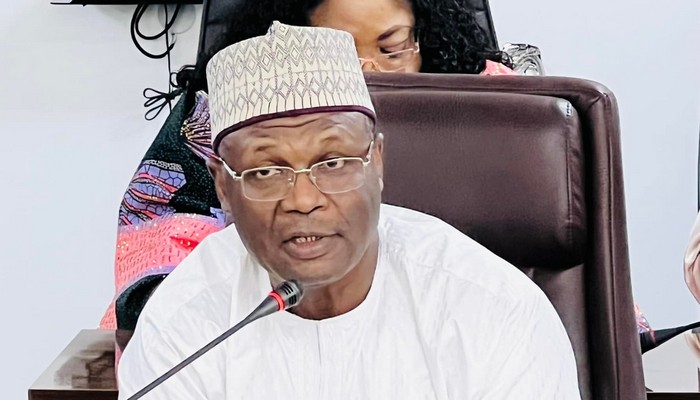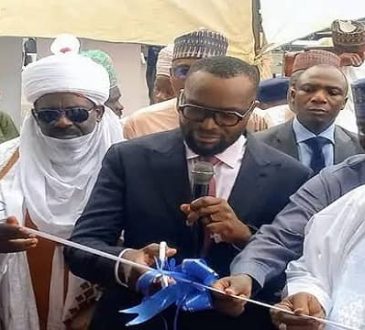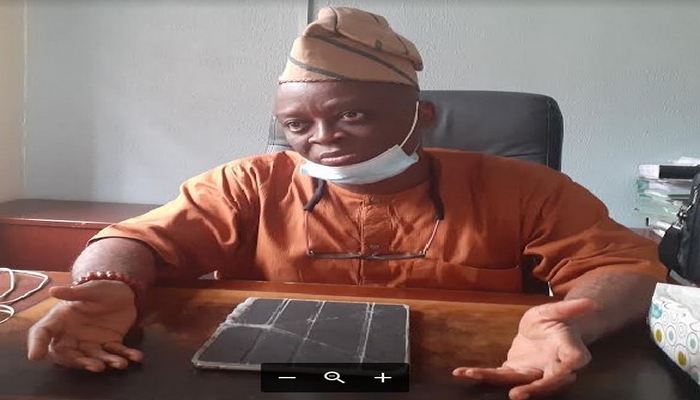
Mogaji Ori Adeyemo, the Managing Consultant of Forensic Consulting, a Nigerian foremost forensic accountant, played host to the Business247News Online team in an engaging one-on-one interview at the weekend. The Ibadan high chief was in his elements as he responded to various issues put before him. Happy reading.
What would you say is the greatest problem of the Nigerian economy?
Corruption is the number one problem. Though the present administration in Nigeria is trying to rein in on corruption, but their efforts are being frustrated by collaborations. No matter how good the intention of the government, collaborations will destroy whatever measures put in place. Ordinarily, when you have a structure in place against corruption, you have other structures to checkmate one another through the laid-down process of reporting. Through this, one party can blow the whistle to expose the corrupt party(s), but when you have all the units coming together within the same system to agree to be corrupt, then whatever system that is put in place to checkmate corruption would have been defeated.
Just like the issue of the former acting Chairman of the Economic and Financial Crime Commission (EFCC) being investigated for corruption. That speaks a lot about how the issue of anti-corruption Nigeria is being handled and I don’t think the government alone can do it, it needs the full involvement of all facets of the Nigerian society, but unfortunately the Nigerian values these days is too poor to the extent that people now value, appreciate and encourage corrupt practices as against good values. People no longer ask how did you make your money even if it is obvious that an individual is corrupt, they don’t care, they just want their own share of the spoils. Until there is a reorientation of values and maybe if we can introduce swearing in of officials with Ogun and Sango and other deities that people are afraid of. With this, I’m sure nobody will want to go into government to steal but if we keep using Quran and Bible to swear in elected officials, I’m sorry. I’m not against Christians or Muslims way of swearing our officials, but try Ogun and Sango and see how many people will want to go into government with intention to steal,
How has the judicial system helped in the fight to get things right in the country?
Though I’m not a lawyer, the law as I know it is against fraud and corruption but the issue is, we have corruption pervading the entire system and there is collusion among the various units of governance just like I said earlier. If a prosecutor is going to court against a perceived corrupt official and goes to court with the minutest allegations and leaves out the big ones, what do you think the court will do? The court will rely on the evidence before it and then people will now say the court is biased. What I know is that it is what you bring before the court that the court will adjudicate on. Then, when the investigation is shoddy or based on playing to the gallery and everybody adjudges the suspect to be corrupt and such allegations cannot be sustained in court, people will say the judicial system is corrupt. I am not holding brief for the judiciary; in some cases, the judiciary is just working with the facts presented before it. If you want to prosecute an individual for corrupt practices and you don’t have competent witness and you don’t have competent prosecutors and the suspect has competent people handling his case, your allegations will definitely be dismissed. The question is this. Why can’t the prosecutors like the police, engage professional forensic accountants to help them in the prosecution and investigation because it is much more difficult for a professional like a forensic accountant to be compromised because if you as a professional is compromised, if there is credible evidence against you, you can be reported to your professional body. Tell me, how many prosecutors have been dragged before a court of competent jurisdiction for poor handling of cases, but with professionals it’s a different thing entirely.
Then secondly, the judicial system in Nigeria is very slow in its processing to the extent that between the time they start the prosecution to the time they complete it, some of the key witnesses are either dead or are no longer interested, they might have left the system or they’ve even left the country, So, in such a case, to gather the relevant witnesses together is a problem.
Then, another issue is this. With all due respect, the Nigerian judicial system needs to be rejigged with competent Judges who are experts in a particular field so that if the Judge is an expert in criminal law or in civil matters, cases should be brought before them accordingly. But what we have is a situation where they feel that every judge is a master-of-all just because before he becomes a judge, he should have gone through law practice and because of his experience, he knows where his interest and competence is and where he belongs. Though, some will argue that as a judge you should know every aspect, but just as in medicine, it’s not possible to know everything. I don’t know every aspect of accounting because since I qualified in 1995 and did my induction in 1996 as a chartered accountant, I’ve not been practicing auditing. So, if you give me an audit job to do, I’ll be left with residual knowledge because my core competence is forensic accounting. So, the National Judiciary Commission has to do something about the judiciary process and let judges specialize in different aspects of law.
Also, in some instances, lawyers representing parties cause unnecessary delays. Once they know that a Judge is about to retire or about to be moved higher, they begin to drag feet, filing one application upon the other so that by the time they bring a new judge, the matter will start de novo.
How would you describe the relationship of our service providers like Power Holding Company of Nigeria (PHCN), telecommunications companies, banks and others, with their customers?
Let me start with PHCN. As we have it now, it is a bit better than how it was. It is more structured now, though there is still a lot to be improved on. I know many Nigerians will not agree with me that there is improvement, they will say I’m speaking as an elitist, but I have my reasons. Firstly, the retail end of power distribution in Nigeria has been privatized into distribution companies (DISCOs) as well as the and generation companies (GENCOs). The only one controlled by government is the power transmission. Now, for the fact that the generation has been privatized, and fixed amounts has been put for units of energy generated and such generation capacity is being guaranteed by the federal government, then it is a plus for the Nigerian economy because it then means that the more you generate, the more money comes to your pocket. Now, the lacuna is in distribution. The DISCOs need to do more because a lot of them don’t even have the capacity to absorb all the generated power to the extent that they beg the transmission companies not to give them as much power. So, in such a situation, people will turn around and blame the Federal Government, why not blame the distribution companies which cannot absorb as much as most of their distribution gadgets are obsolete. But I think the distribution companies are beginning to get some of these issues right because they now target specific areas which they call premium areas and give them supply so that at least they can recover some of their money. How come the transmission companies are giving more light to Niger to Benin Republic and leaving out Nigerians? It’s because the market is there. There is also market in Nigeria, but our distribution companies don’t have the capacity. I say it is better than before because if the federal Government decides to take over the DISCOs, it’ll be worse. Since the DISCOs are privately owned. Yes, I’m aware of the estimated billing system. I’m also aware of the efforts by the electricity regulatory commission to ensure that if a household is not given meter, then you cannot impose any estimated billing on them. But how about the enforcement? It takes us back to the same corrupt system we are talking about We have on the ground, the law that says if you don’t give prepaid meter don’t go to that building to give estimated bill and that it is not compulsory for the customer to pay in full for the prepaid meter rather they pay in part on supply and the balance is added to their bill gradually. But this is not being enforced. Everything still boils down to the same corruption because if you have the law and nobody wants to enforce it and when the head is rotten the whole fish is bad.
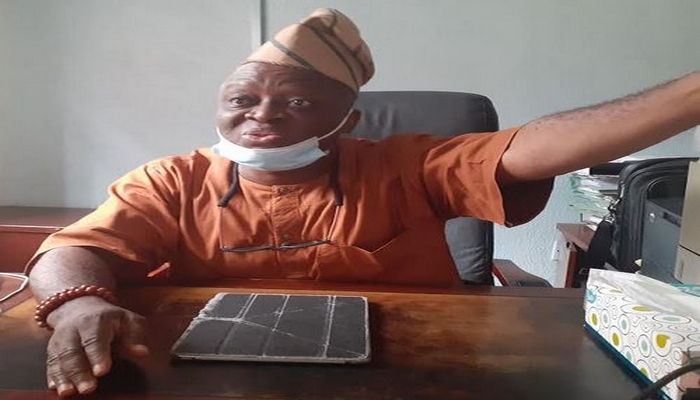
Now to telecoms, I am aware that all these telecommunication companies are ripping off Nigerians. Ask yourself if it is possible for a Nigerian to have access to his statement of accounts for their mobile lines? The answer is no. It is possible for you to load N20,000 today and tomorrow you are left with zero balance and when you reach out to their customer care, they start telling you stories and if you go to the National Communications Commission (NCC) nothing is done about it.
So, the telecommunication industry is the least regulated in Nigeria while other regulatory bodies are seemingly trying to do something, the ones in the telecoms industry are just sleeping. I have had cause to petition some of these telecommunication companies in Nigeria to NCC, I’ve never received one line of response. I personally took those petitions to NCC office in Abuja, they even gave me acknowledge copies not one line of response has been received. One can simply conclude that NCC is useless.
Let’s take a look at the contracts between the telecommunications companies and their dealers which most times involves the dealers getting a particular commission for selling agreed number of products usually SIM cards within a specified time and entitlement to a certain percentage of the calls made on those lines or data expended on those lines. But, lo and behold, you notice that once these dealers have assisted them grow big, they send the dealers packing for some flimsy reasons, like saying products assigned to them was found in another region, knowing full well that the dealers can’t monitor or control such, they’ll say because you did not meet your target for a particular period, therefore, they are terminating your contract.
Now, during the pendency of the agreement, when you agreed with them that a particular commission on those calls made on the sim sold by the dealers be paid, most times they aren’t paid and you should know the Nigerian mentality. When it comes to enforcing their rights, they leave it to God but when it comes to religious issues, when you insult their pastor or imam, they put it on their head but when it comes to fighting for their right, they leave it to God. But these issues more often than not, don’t come to light as Nigerians don’t fight for their rights because they feel it will be an exercise in futility, maybe because they don’t trust the judiciary.
I was involved in the case between Airtel Nigeria and Plus Limited in which the Court of Appeal gave judgement in July this year and the decision of the court was that Airtel was to pay N4.888 billion for alleged debited invoices into Plus Limited’s account which could not be supported by any relevant or credible physical invoice to show that such goods were sold to Plus Limited, Ab initio. I was the forensic accountant for Plus Limited, we started the matter, I think in September 2011 and the Lagos High Court sitting in Ikorodu gave judgment in 2016 and the matter went to the Court of Appeal and we got the judgment in the Court of Appeal, the N4.8 billion is different because airtel refused to give the mutually agreed call logs as the agreement they had every year was for airtel to engage external auditors on their own to look at the call logs of all the lines about 18,000 lines sold by Plus ltd. to different subscribers and then come up with the 5% or 6% due to Plus ltd. which they never did. So when the matter went to the Lagos high court we demanded for those call logs, Airtel said they were willing to provide them but they don’t trust me as I was appointed by an interested party, so they approached the court to mandate the Institute of Chartered Accountants of Nigeria (ICAN) to nominate an independent auditor they can release the requested documents to and the court granted the wish of Airtel and Doyin Owolabi & Co. was nominated. Unfortunately, they frustrated Doyin Owolabi & Co by not giving them any of those requested documents not even one so at the end of the day Doyin Owolabi reported back to the court that these guys didn’t cooperate with me, they flouted a court order by not releasing the documents and those documents are in the full custody and control of Airtel. So, the matter went for trial and my report was that the report I produced was not conclusive because of the non-release of the documents. Now, the Lagos high court agreed with us and told Airtel to pay the missing N4.888 billion worth of invoices and that they should produce the call logs of those 18,000 lines and give them to me as the consultant to Plus ltd. They went on appeal and raised three issues. The first issue was that the case was statute-barred to which the Court of Appeal disagreed saying the agreement between Airtel and Plus Limited was terminated in May 2011, Plus limited went to court in March 2012 about 10 months after, and when you talk about statute of limitation in commercial agreement its six years thus the issue isn’t statute-barred. The second issue they raised was that Plus Limited admitted owing them. The court again disagreed that though Plus Limited wrote some letters to them, they said those letters alleging that they were indebted to Airtel was as a result of misrepresentation made by Airtel to them that they were owing them and that they didn’t even know how much they were owing, but in the interest of relationship, they wrote but didn’t state any amount, so the issue was thrown out .The third one was that my report was inconclusive, the Court of Appeal now said yes, the report was because Airtel refused to provide relevant documents to the consultant which is me and that the report of the 4.8 billion Naira missing invoices is clear.
It is not only for Plus Limited but for so many other dealers who had fallen into this trap set by these people. I have over 400 court cases that I’m managing concerning different banks and organizations because of my strong believe in the rule of law.
I’m also aware of the efforts of the federal consumer protection agency. I’ve heard a lot of good things about the agency. I think they’re doing a good job but the capacity is what I’m not sure of that is being able to go round the entire Nigeria. I don’t think this agency should be alone in fighting for the consumers. Even state governments for example the Lagos State Consumer Protection Agency should be there to assist Lagosians but I don’t know what those guys are doing and I think it’s because of this inefficiency that some individuals came out with advocacy progamme to held the people.
Myself and Sola Salako, before she got married, did a lot of good things together when she was still running the consumer protection agency advocacy group. We corroborated in checkmating CBN in order to protect the customers. At various times, we worked together and the CBN listened to us. I must confess especially that of the CBN guide to bank charges of 2013, but I think the federal government needs to do more and other NGOs have to combine to fill the void and the Lagos state consumer agency and every other state in Nigeria needs to do more.
To be honest with you, the NCC has a lot of good guidelines and regulations. Go to their website, you would see very beautiful guidelines and regulations, but the implementation is negative not even zero, negative. So, I believe they are really compromised against Nigerians because they are not protecting Nigerians at all. For such agencies, I think they need a change at the top so that Nigerians who have interest of the people at heart can come in.
On the issue of paid TV. I’m not an expert in that aspect, but what I think the Federal Government should have done is to open up the field, break the monopoly of Multichoice and give chance for competition so that the price can go down. We know the business is capital intensive, so if you take a loan from a bank and you are paying heavy and manipulated interests and charges to the detriment of the customer, at the end of the day, if the contract is about to expire you may not get their support and we know how the Nigerian system works. While the Nigerian competitor is borrowing money at 25 per cent, 30 per cent per annum, his counterparts from other parts of the world are getting theirs at one per cent, two per cent, so how do you compete? It’s difficult and the banking industry isn’t helping the economy, they operate to devour hapless Nigerians and the CBN is not doing anything about it because rather than the CBN to regulate the banking industry, it is the banks that are regulating the CBN. I’ve said this several times and don’t be deceived when somebody tells you that the Nigerian banking industry is solid, they are living on borrowed times and government money. Currently, because the government has a policy not to allow banks to go under so as not to jeopardize the living standard of Nigerians. How do I mean? If you allow a bank to go under, and such a bank is handed over to the Nigerian Deposit Insurance Corporation (NDIC) what happens? Many Nigerians who have deposits in those liquidated banks would not get anything until all the secured creditors are settled, like government preferred bonds and all the rest are settled, before that the ordinary depositors don’t have anything to collect. So, a lot of people lose money and a lot of households will be affected. That’s why the federal government rather than liquidate those banks, they will hand them over to Assets Management Company of Nigeria (AMCON) or set up a bridge bank per Section 29 of the NDIC Act and continue to run those banks like Skye Bank which later became Polaris Bank, Bank PHB that became Keystone, Enterprise Bank that became Heritage Bank, amongst others. Ordinarily. those banks would have gone under but because the Federal Government didn’t want Nigerians to suffer. Some banks today are still existing because of mercy of the Federal Government of Nigeria.
Bank charges this day. How do you see it?
When we were growing up, no charges were levied on savings accounts because they are meant to grow and give you interest then on a quarterly basis. When you take your passbook to the bank, they will calculate your interest and put it there, but unfortunately in Nigeria of nowadays, you no longer get anything except for them to put sms and other charges to make sure that a savings account owner now ends up owing a bank. It is antithetical. It is unprofessional for a savings account holder to owe a bank and most Nigerians don’t know what to do about it. As a Nigerian, if you leave a million Naira in your savings account for about two years, by the time you come back the whole two million Naira may have gone. So, is that encouraging saving or discouraging savings culture and if you have an economy where people don’t save and consume everything, that economy cannot grow. For the P.O.S and mobile money operators, I think section 9 or 10 of the 1st of January 2012 CBN guide to charges by financial institutions regulates all charges. These P.O.S people who operate are supposed to pay to one, the banks and two the owners of the platforms, but unfortunately when a bank wants to defraud a P.O.S operators, they won’t receive the alert of the debit charged to their account. When the operator finds out like debit of 100 Naira at the end of the month, they won’t want to leave what they are doing and leave their customers hanging to go and confirm how 100 Naira was deducted from their account. Thus, the money is gone. Calculate 100 Naira from one million customers for doing nothing. Tomorrow, they steal another 100 million and that’s why the banking industry seems to be striving even when the Nigerian economy is bleeding because they’re stealing a hell out of Nigerians.
I can prove it to anybody that the Nigerian banking industry is over trading, doing too much too quickly with too little working capital and when you over trade, with all due respect, the implication is that the bubble can burst at any time, as they are using other people’s money to do business. So now, what efforts are being made by CBN, what remedies are open to Nigerians? The remedies to the poor Nigerians are nonexistent. Even if you approach the Consumer Protection Department of the CBN, they don’t do anything about it. Show me any Nigerian that has gotten any reprieve from the CBN. At some point. they said the CBN has been able to recover 50 billion Naira from excess bank charges for their customer. That is a lie. You know why? I personally have over 400 court matters that I’m managing for different customers against banks in Nigeria and before any of my clients will approach any court of competent jurisdiction, I report such matters to the CBN. I always tell my clients; look don’t let us rush to court. They have a regulator called the CBN, before we go to court, let’s report to CBN. So, as I’m writing the complaints to the bank, I’m sending a copy to the CBN governor. But as I’m speaking to you, CBN has never raised one finger to resolve any of the issues. So. when they say they’ve recovered some amount of money for different customers, I ask how come none of my clients are beneficiaries. So, I want Nigerians to discountenance such claims. Let the CBN publish the names of the beneficiaries and let us see. That’s why you have the courts being bombarded with different court cases against banks as the CBN not trying enough to expeditiously resolve such issues amicably between the parties. So, CBN and even all regulatory agencies should do more to help hapless Nigerian consumers.
There’s was a viral video on the internet recent where Barrister Oghala said there is no successful corruption cases without the bank’s involvement. What’s your take on this?
The man is 101 per cent correct. Every government money ought to be in government’s account, allocation from the federal government goes into the bank, IGR goes to bank accounts, foreign grants or donations or loans goes into banks, right? Now how can a government official steal money, knowing very well that there are financial regulations and hurdles to cross because the laws are there. In Nigeria for instance, there is a limit to the amount of cash you can withdraw on a daily basis according to the CBN, though they don’t have the power. they say the banks should impose penalty on the customer but because of patronage from government because they use government money to boost their liquidity profile on a daily basis, so no bank wants government not to do business with it, thus they wave a lot of regulations for them even when it is obvious that the purported act to be carried out is fraudulent against the state, the bank officials will do it because of their own interest not because of the interest of the masses. 100 per cent, I support barrister Oghala who made that statement. It is not an allegation it is a fact; the man has spoken the fact that look, rein in on banks first and corruption in Nigeria will drop drastically. I didn’t say it, he said it and I concur.
The NDDC probe do you think forensic accountants should have been involved? Can you say that forensic accountants in Nigerian are being optimally used to tackle corruption?
What I understood from the probe is that NDDC had gotten some financial accountants to help look into their records that is all that I know. When they started how they started, the scope of their assignment I don’t know. It then means that until there is a contrary information, I want to believe that forensic accountants are being engaged by the NDDC in its probe going to the issue of the house or reps probe before we go into the issue of fainting or no fainting and all that drama and acting, I don’t believe that a forensic accountant is need at this junction. On the probe by the House of Reps because it is only the primary actors that are involved that need to answer questions because they are the ones directly involved, a forensic accountant isn’t needed now. What the forensic accountant can do is to give you a deep insight based on the records made available to him.
What is you view on the reported issue of tax abrogation by Governor Ayade of Cross Rivers State?
Governor Ayade was said to have cried that citizens of the state were being overburdened with taxation and all the rest and that his people are suffering and that he spent five years in government and that he dint know that some areas in his state have mud houses and because of that he wants to wave taxes. I had to respond and my take was that it is only the President of the Federal Government of Nigeria as well as the Minister of Finance that can wave taxes whether personal income tax or company income tax for people. So, Ayade cannot, on his own, set up an agency without a concurrence of the Federal Government of Nigeria or the Minister of Finance to wave taxes Moreover, every Nigerian ought to pay taxes because the western world have their economies being built on taxes paid by the citizens, so every adult Nigerian must pay tax except those who are retired or those who have infirmity or those incapable of engaging in any profession or activity that will generate money, But if you are earning money, you ought to pay your tax whether direct or indirect tax. So, Governor Ayade cannot do that. Secondly, if you read the Personal Income Tax Act, there is provision for those who are earning below 30,000 Naira annually not to pay tax so he doesn’t need to tell people that are poor that they don’t need to pay tax. The state governor has the power to reduce taxes only on an individual basis. That is if the board assesses a tax payer to a certain amount, the governor can say based on so so factor, the advice of the board as well as the commissioner for finance, he can exercise such powers but it has to be on the individual basis. Governor Ayade since he is a professor needs to listen more to his tax experts. Personal Income Tax Act is under the exclusive legislative list not on concurrent list. But on a personal basis, he can do that.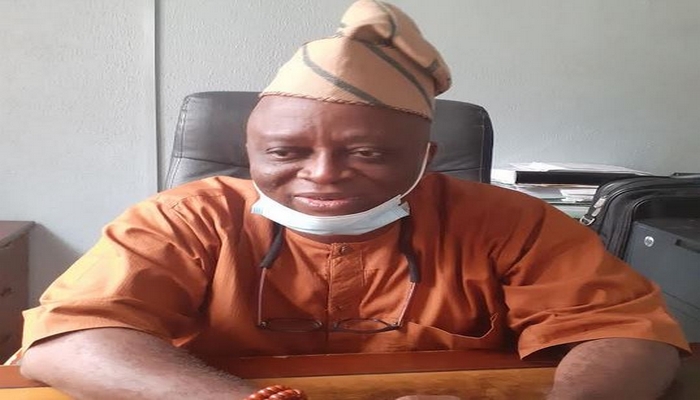
What’s your advice to the Nigerian consumers?
Nigerians should be vigilant and they shouldn’t be docile. They should demand for their rights. It may seem so far but justice will be done for them at the end of the day, that is if they take the normal legal actions against any erring service provider. So, they shouldn’t just say I can’t get justice in court, I leave it to God. Yes, God is there, but you cannot say because God is there you won’t go and find something to eat that God should drop manna from heaven. Every day, you still go ahead to look for food for yourself and family. So, if anybody should trample on your rights, take measures against such people and leave the rest to God.
The only CBN era that I would say has really favored me in my fight for the ordinary Nigerian was when the late Umaru Musa Yar’adua was the president of Nigeria. I wrote a petition to CBN that banks should have uniform accounting year end and he agreed to it. He wrote to me personally and directed CBN towards that. Also, there was a time one of my clients had issues with former legacy Finbank. I wrote to him and he responded accordingly telling me to contact the then CBN governor Lamido Sanusi. This means that if the Federal Government can mandate the CBN to do the right thing, we won’t be where we are today. I’m sure if he were to be alive, he would have radicalized the banking industry because anything we wrote to him about with facts, he would respond accordingly. I also wrote during the Goodluck administration but nothing came out even during the time of the probe of the banking industry in 2007 under President Obasanjo, I wrote and nobody did anything.



